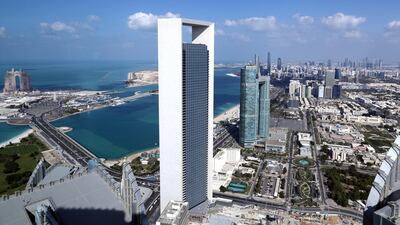Abu Dhabi National Oil Company launched a second competitive bid round for hydrocarbons, offering unconventional reserves for the first time as it looks to attract international oil companies to explore for oil and gas.
Five block are on offer, of which three are offshore and two onshore, stretching across an area of around 34,000 square kilometres, Adnoc said in a statement on Wednesday.
Offshore Blocks 3, 4 and 5, as well as onshore Blocks 5 and 2 are open for bids, with the latter offering two separate licensing opportunities for conventional and unconventional hydrocarbons.
Adnoc will look to close bids by the end of November, with the first awards expected in the first quarter of 2020, Abdulmunim Al Kindy, upstream director at Adnoc told reporters in Abu Dhabi.
State-owned Adnoc manages much of Abu Dhabi’s crude output, which accounts for 4.2 per cent of global production. The producer for the first time in 2018 launched a licensing round, which concluded earlier this year with award of blocks onshore and offshore the emirate to companies from Abu Dhabi’s biggest buyers such as India and China, as well as western energy firms such as OMV, Eni and Occidental.
"The launch of Abu Dhabi’s second licensing bid round builds on the momentum of the first and very successful competitive bid round," Dr Sultan Al Jaber, UAE state minister and Adnoc Group chief executive said in a statement. "It demonstrates how Adnoc’s expanded approach to partnerships is enabling us to utilise value-add partnerships and smart technologies to drive new commercial opportunities and efficiently accelerate the exploration and development of Abu Dhabi’s untapped resources,” he added.
Blocks in the second bid round hold multiple billion barrels of oil and multiple trillion cubic feet of natural gas, according to estimates based on existing data from detailed petroleum system studies, seismic surveys, exploration and appraisal wells data, the company said.
Some of the blocks already have discoveries and, within the combined geographical area of the second bid round blocks, there are 290 targeted reservoirs from 92 prospects and leads.
Mr Al Kindy noted that in the latest round, Adnoc will look to leverage the bidders’ technical capabilities, given the complexity of the reservoirs, some of which hold both conventional and shale reserves.
"In the second bid round, all the bidders are given the option to bid for both conventional and unconventional. The Arabian Basin has very high potential for unconventional and a lot of that in the UAE,” he said
Last year, Abu Dhabi announced discovery of large hydrocarbon deposits equivalent to a one per cent increase in existing oil reserves as well as a 7.1 per cent addition to proven reserves. The finds, the largest in recent years for gas, have the potential to end the UAE's dependence on pipeline imports and transform it into a net exporter of the fuel.
Adnoc aims to increase crude production capacity to 4 million barrels per day by 2020 and 5 million bpd by 2030. The UAE’s overall crude production in March was 3.09 million bpd, according to figures by Opec.
Potential bidders for the latest round will have 100 per cent exploration rights, with efforts underway to make the terms more attractive given the complexity of some of the geological stacks on offer, said Salem Al Matroushi, senior vice president, exploration at Adnoc.
In the production phase, the operating model is open for discussions with partners, with possibility of Adnoc’s participation, if required, he added.
In the first bid round, Adnoc awarded US firm Occidental rights to explore Onshore Block 3, two offshore blocks to Italy’s Eni as well as Thailand’s Exploration and Production Public Company. India’s Bharat Petroleum and Indian Oil Corporation were awarded rights to an onshore block while Onshore Block 4 was awarded to Japan’s Inpex. Onshore block 2, which had been tendered as part of the first bid round, has been packaged with conventional and shale components for the second round, with companies having the option to bid separately.


